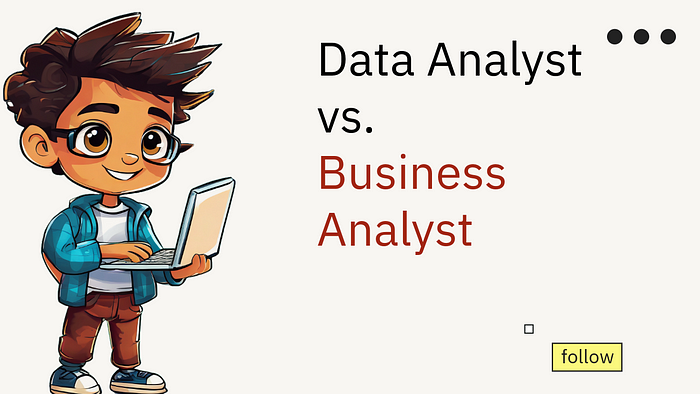Finding Your Path: Distinctions Between Data and Business Analysts
Written on
Chapter 1: Understanding the Roles
In our current data-centric society, both data analysts and business analysts are essential in converting information into actionable insights for organizations. Despite their similar titles, their primary focus and daily responsibilities vary considerably. This guide will clarify the main differences between these two sought-after professions.
Data Analyst: The Data Explorer
Data analysts are the skilled interpreters of our digital landscape. They possess robust technical capabilities and leverage various tools and methodologies to gather, cleanse, scrutinize, and present extensive datasets.
Key Responsibilities:
- Gather and source data from diverse databases, APIs, and other channels.
- Clean and organize data to prepare it for analysis.
- Conduct statistical assessments and modeling using languages like Python, R, or SQL.
- Generate data visualizations, including charts, graphs, and dashboards, to convey insights effectively.
- Detect trends and patterns within datasets.
- Propose data-driven solutions to business challenges.
Skills and Qualifications:
- Strong analytical and problem-solving abilities.
- Proficiency in statistical analysis and data modeling methodologies.
- Expertise in data manipulation tools (such as Python and SQL).
- Exceptional communication and data visualization skills.
- Programming knowledge is increasingly beneficial.
Business Analyst: The Connector
Business analysts serve as the vital link between the business environment and the data domain. They comprehend organizational objectives and challenges, translating them into actionable insights derived from data evaluation.
Key Responsibilities:
- Gather and document business requirements from stakeholders.
- Analyze business workflows and identify improvement opportunities.
- Convert business needs into technical specifications for data analysts or developers.
- Perform cost-benefit analyses and assess the viability of suggested solutions.
- Create and maintain documentation of business processes.
- Convey complex information clearly to both technical and non-technical audiences.
Skills and Qualifications:
- Strong understanding of business concepts and industry trends.
- Excellent communication and interpersonal skills.
- Project management and problem-solving expertise.
- Skills in business process modeling and analysis.
- Familiarity with data analysis concepts and tools is becoming increasingly important.
Chapter 2: Choosing the Right Path
So, which career path suits you best? Reflect on your skills and interests:
Data Analyst (if you):
- Enjoy analyzing data and solving complex problems.
- Have a strong quantitative ability and programming skills.
- Prefer a technical, detail-oriented role.
Business Analyst (if you):
- Have a talent for grasping business needs and converting them into actionable strategies.
- Enjoy interacting with people and simplifying complex information.
- Prefer a role that bridges the gap between business and technology.
The Dynamic Landscape
While the fundamental differences between data analysts and business analysts exist, the lines can sometimes become blurred in practical applications. As data increasingly influences business operations, both roles are anticipated to have some knowledge of the other's domain. Data analysts might be involved in gathering business requirements, while business analysts may need to utilize data analysis tools to comprehend user behavior or market trends.
Both data analysts and business analysts are crucial in harnessing the power of data for organizations. By understanding the essential differences and requisite skills for each role, you can make an informed decision about which career aligns best with your unique abilities and aspirations.
If you appreciate valuable content like this, consider following me and subscribing to my newsletter for more insights on scholarships, fellowships, and data science topics. Don't forget to share this article, and I'll see you in the next one!
